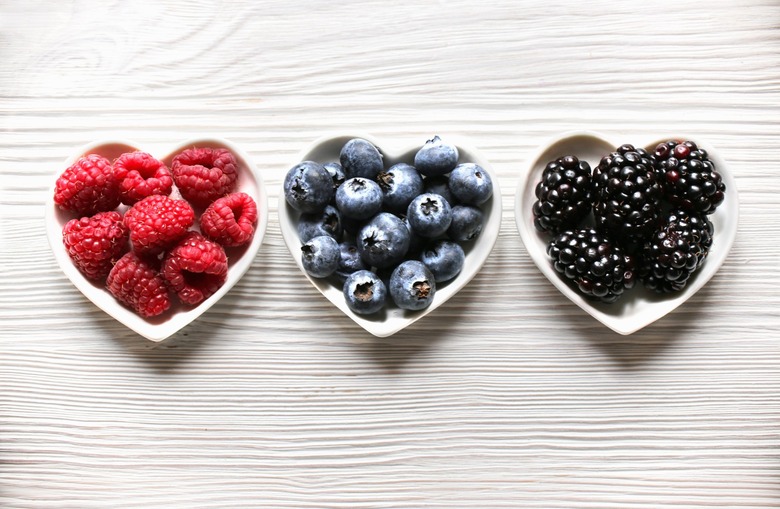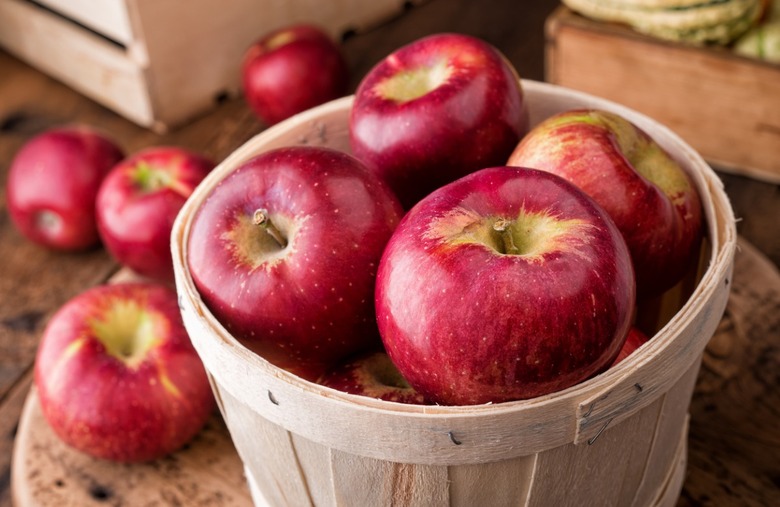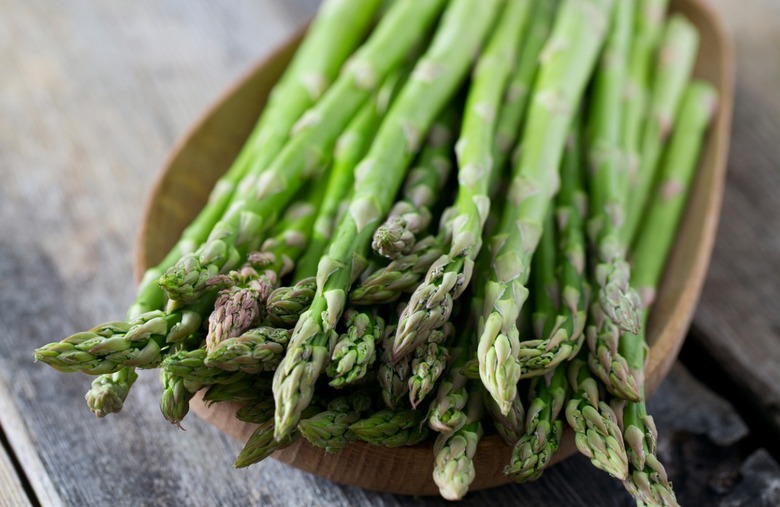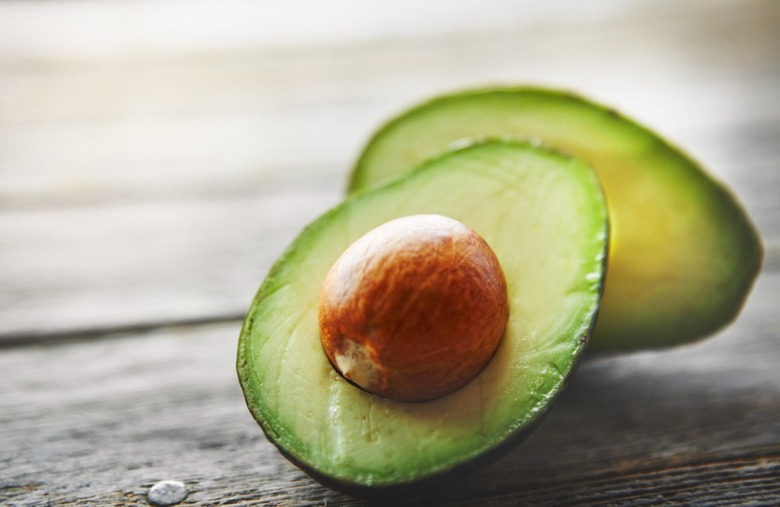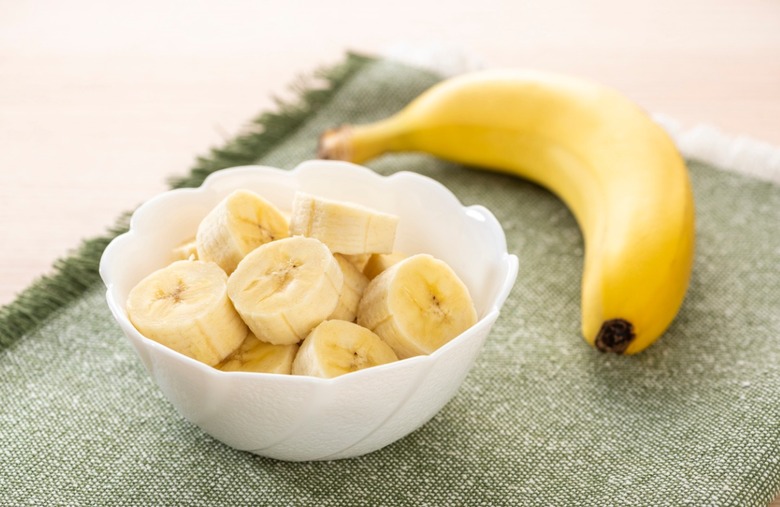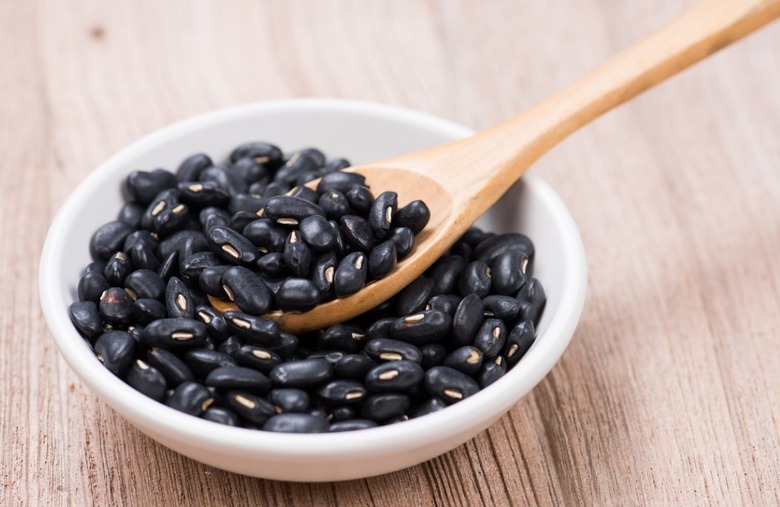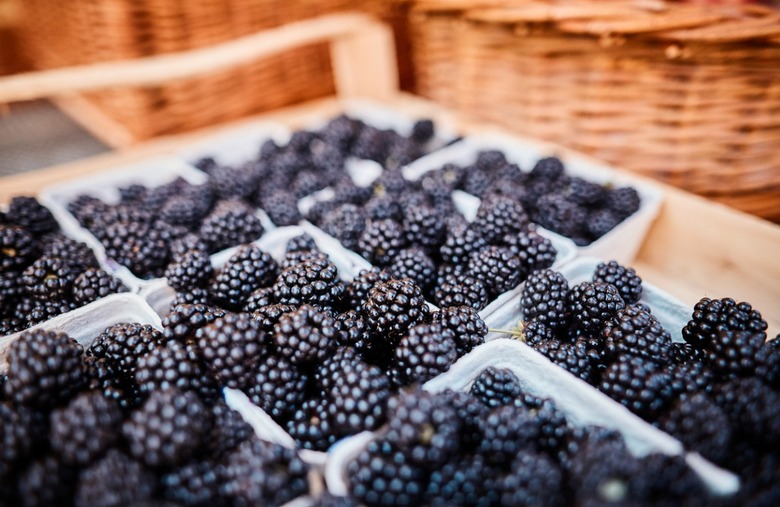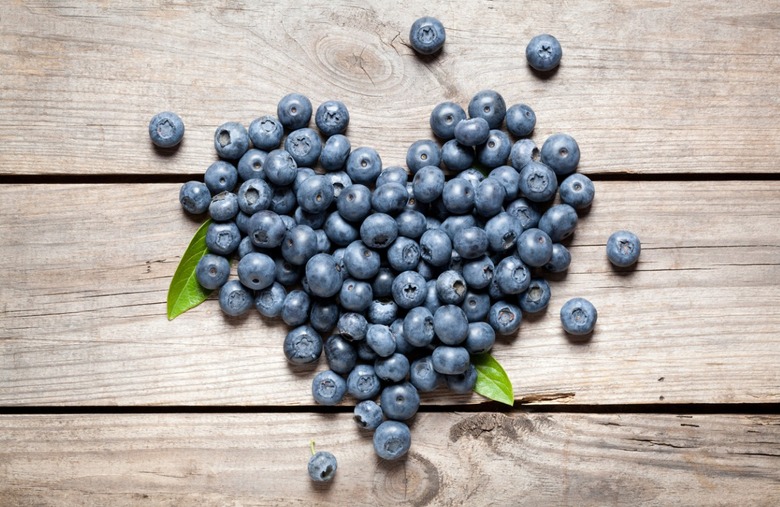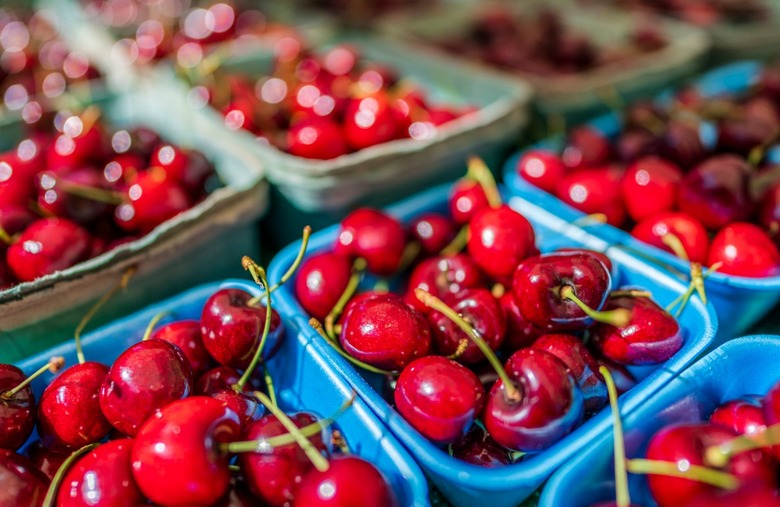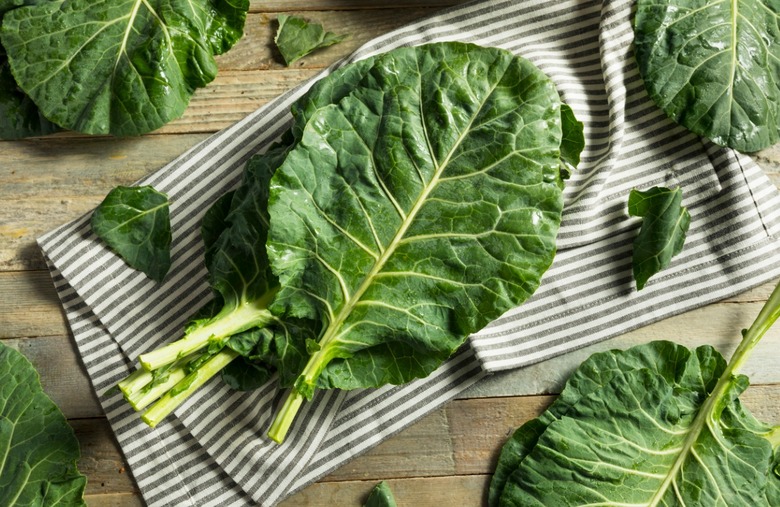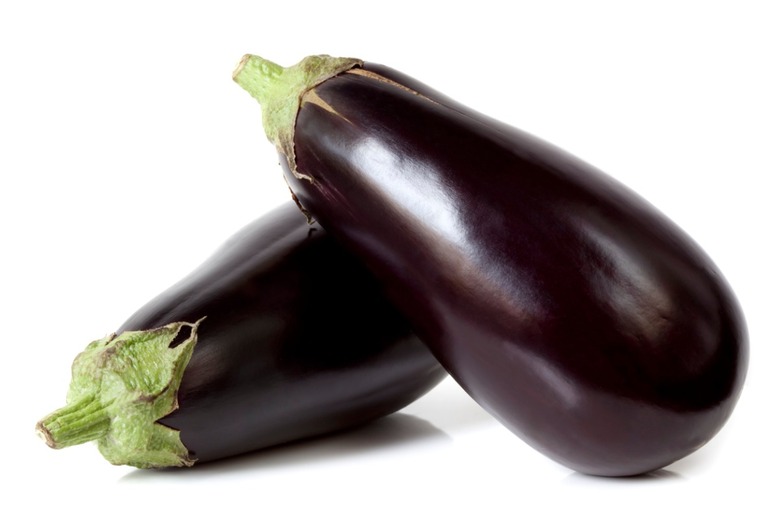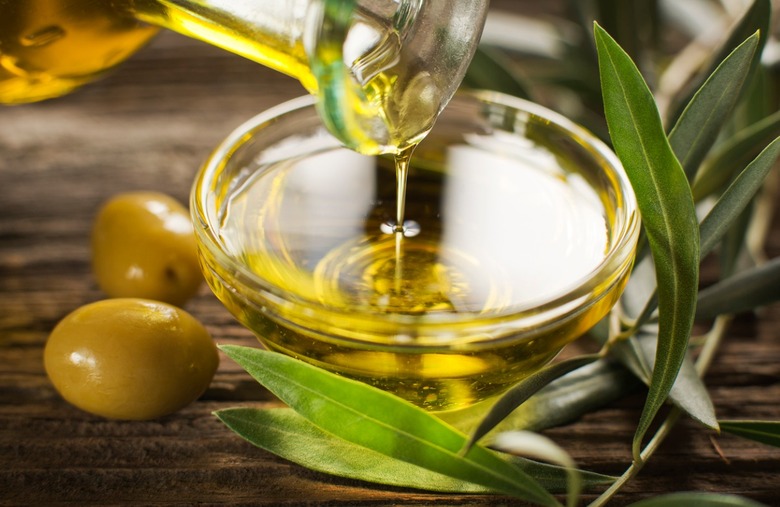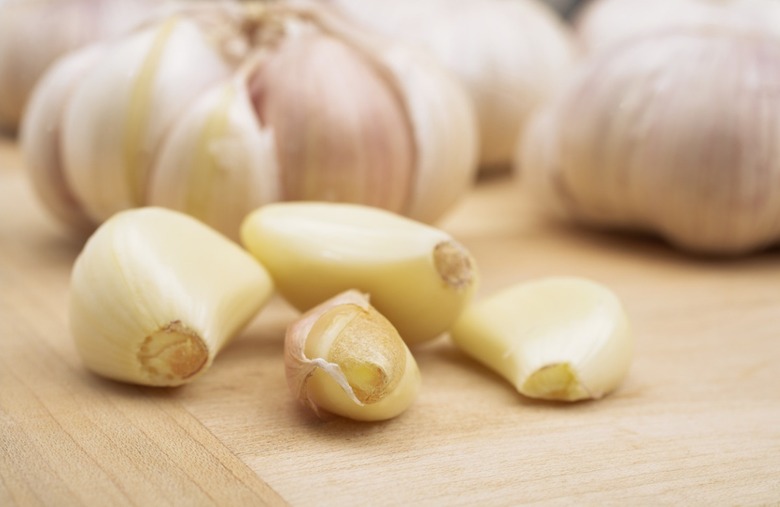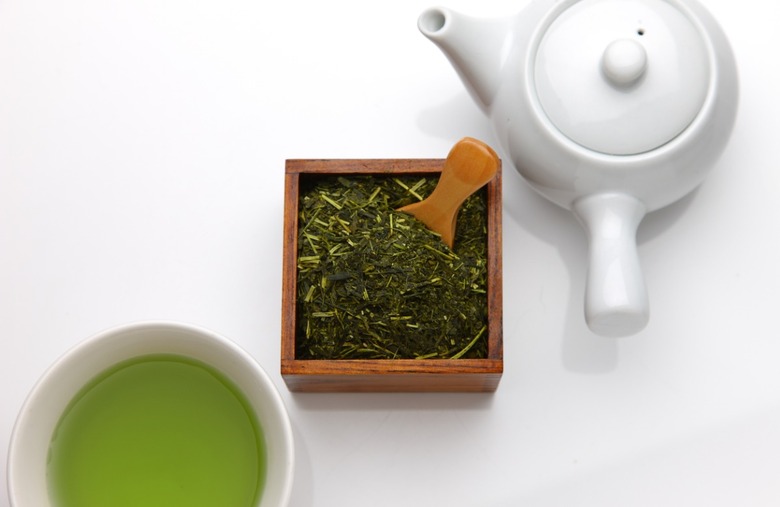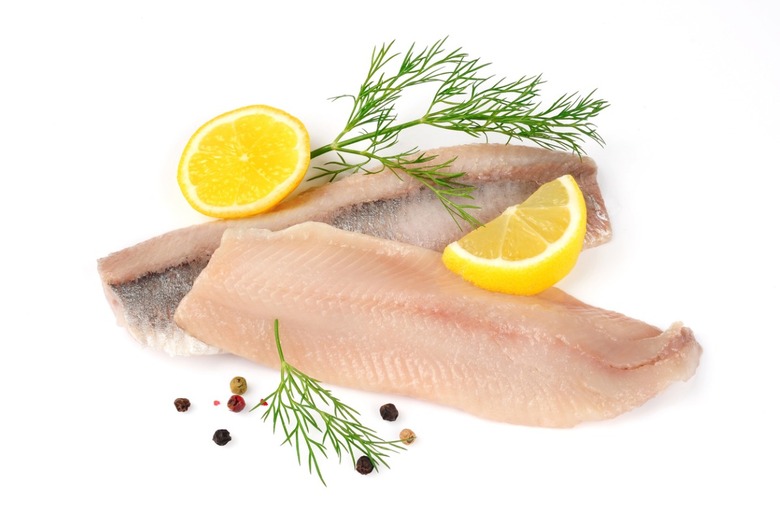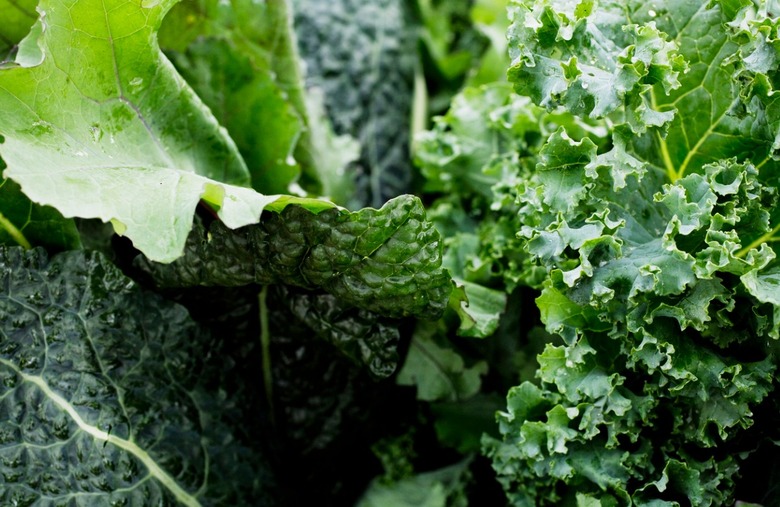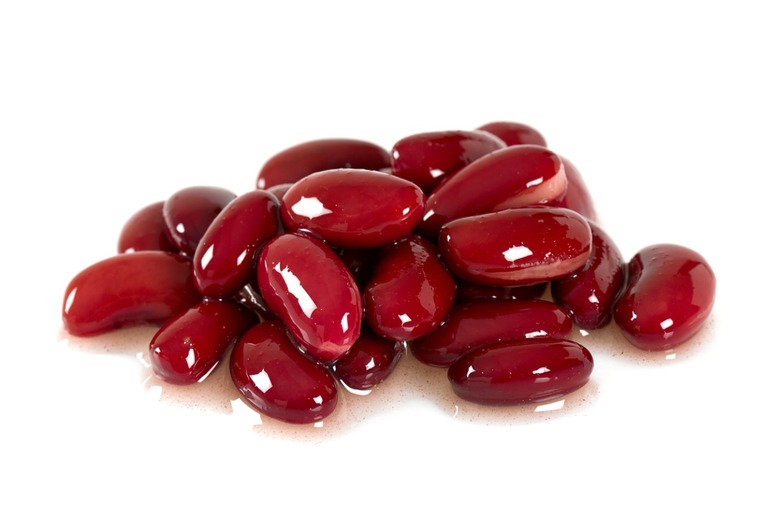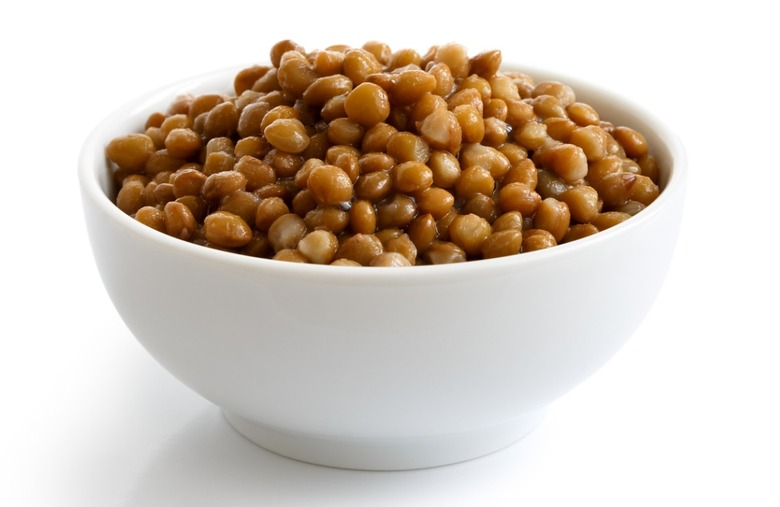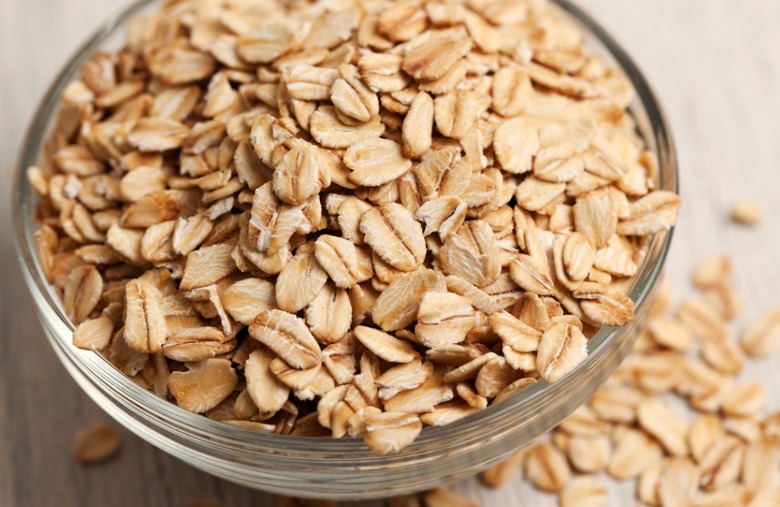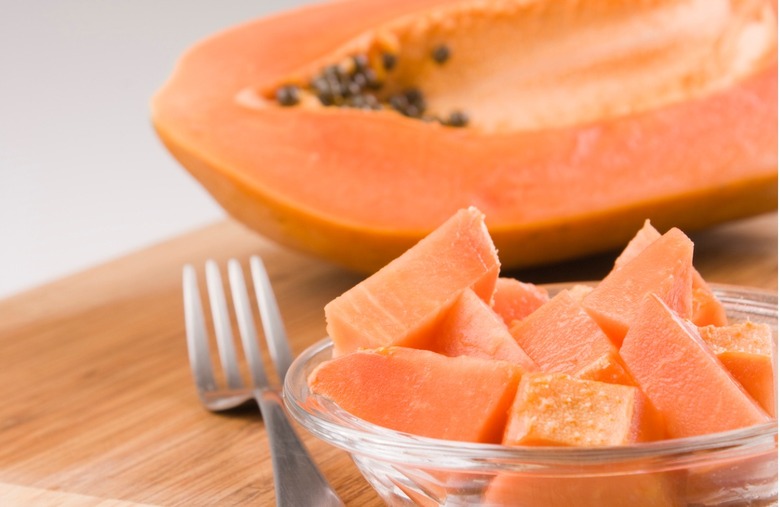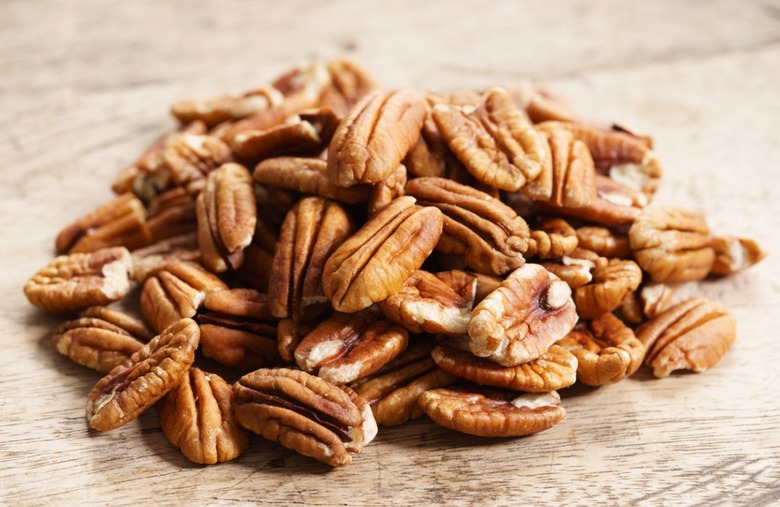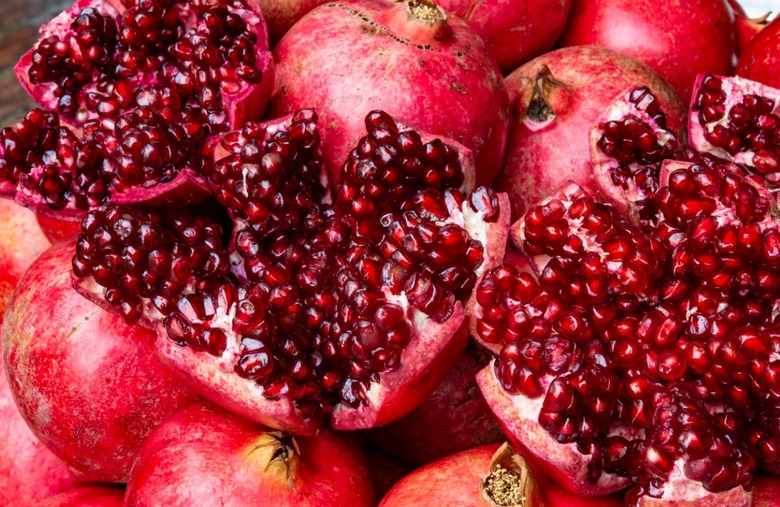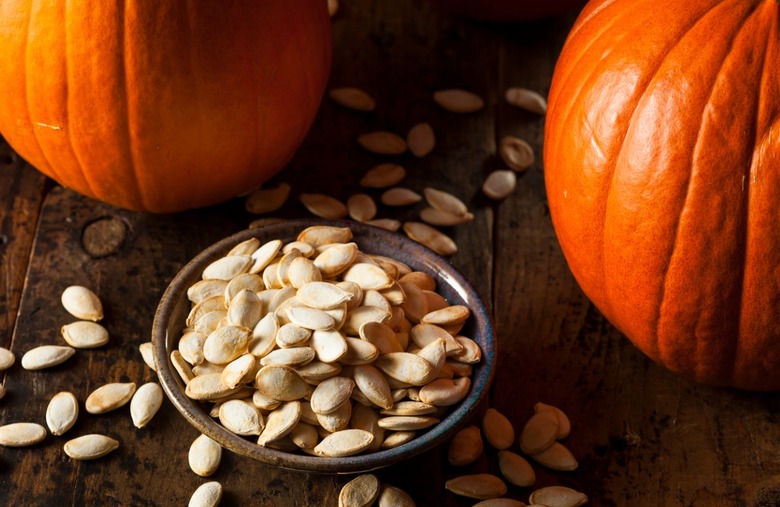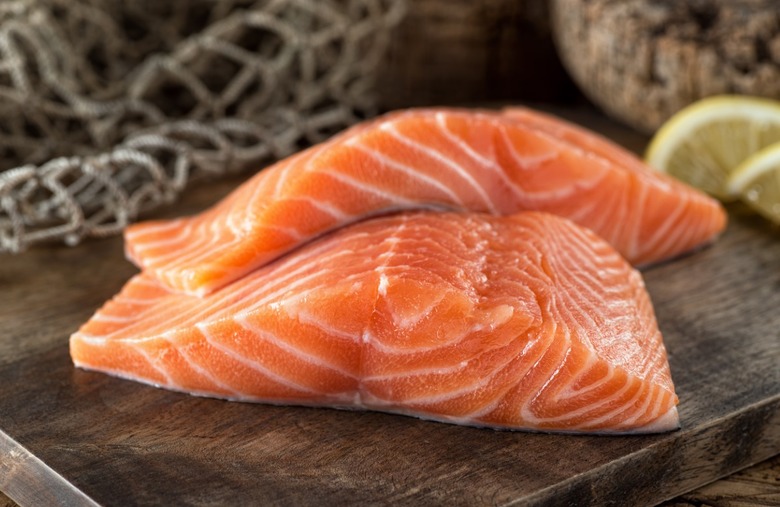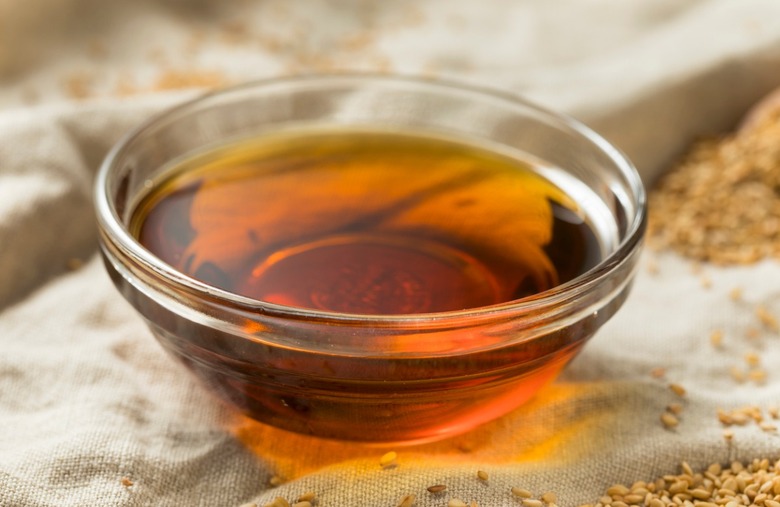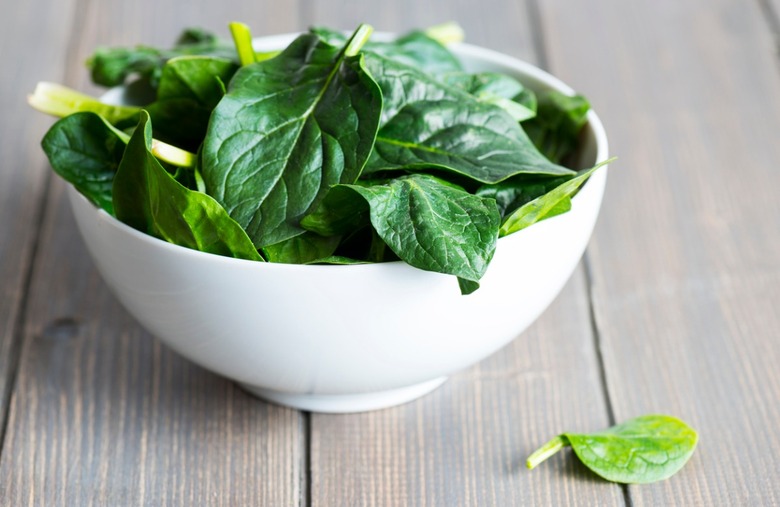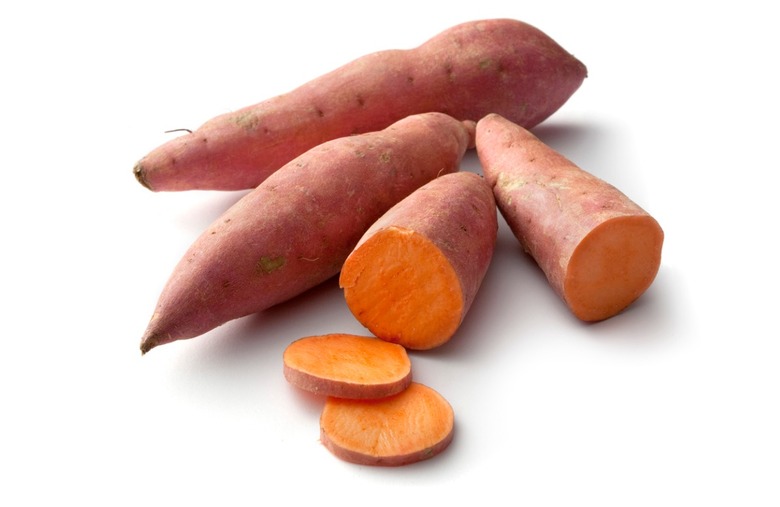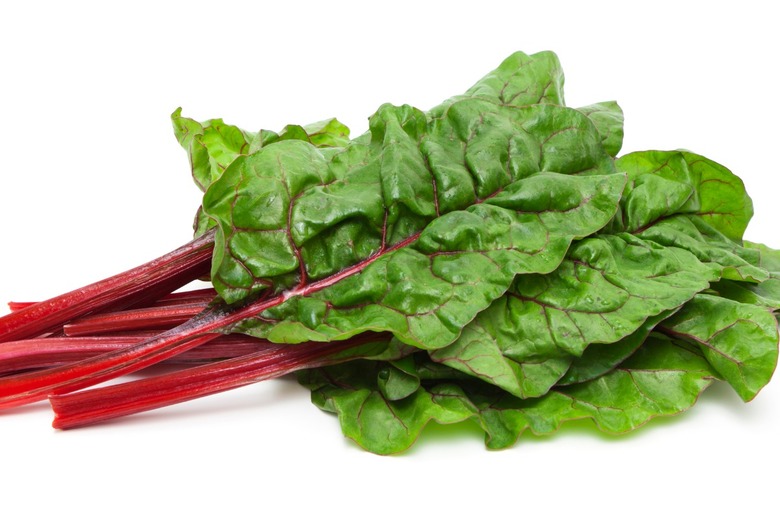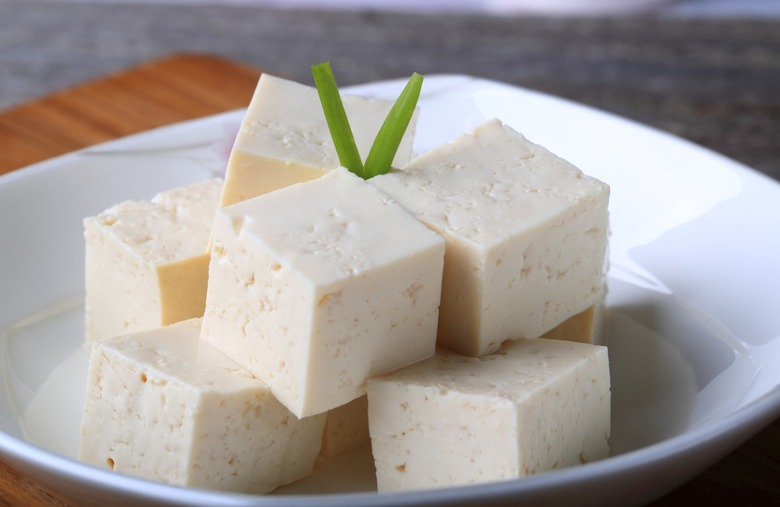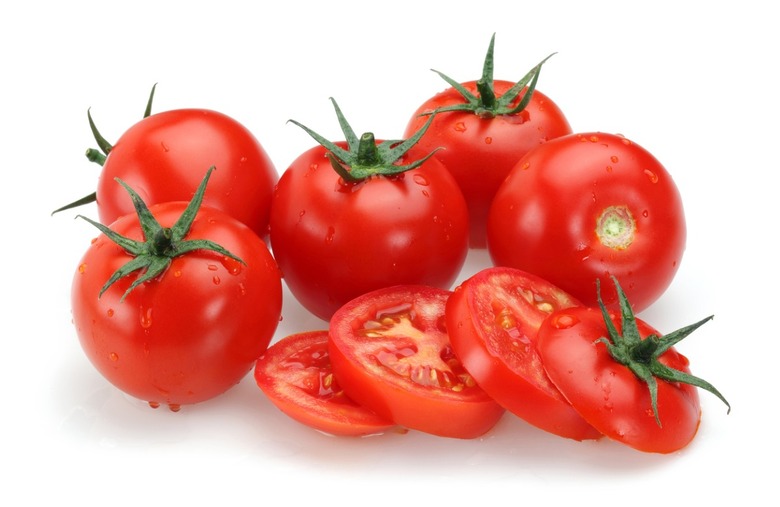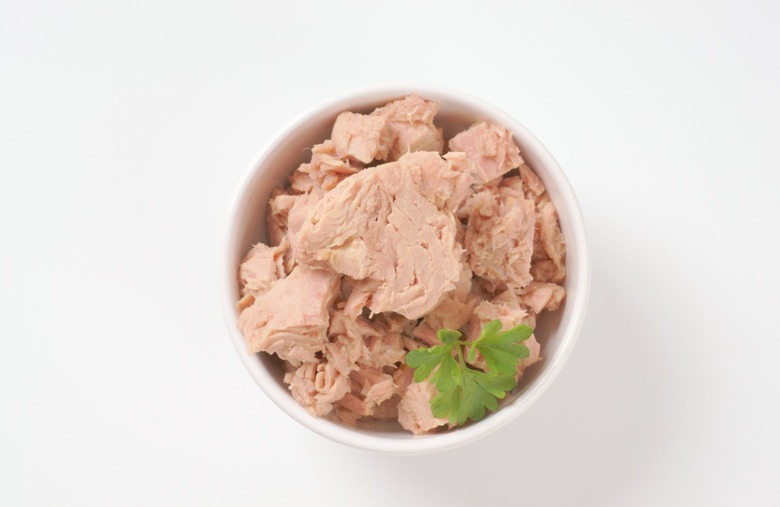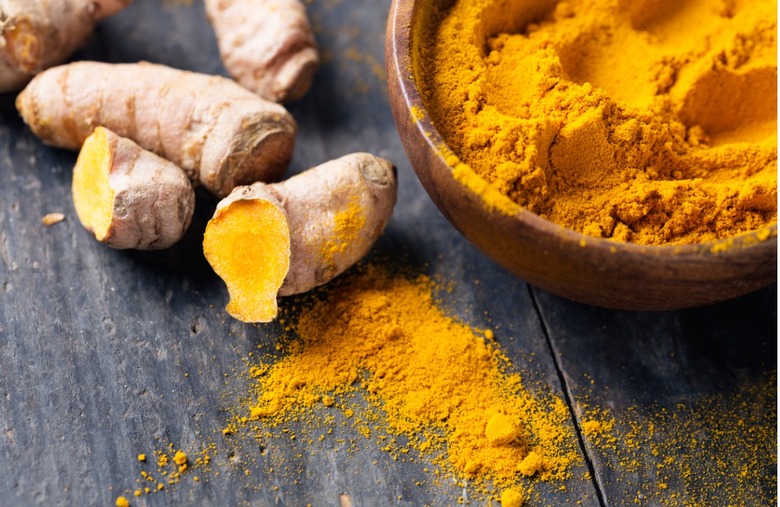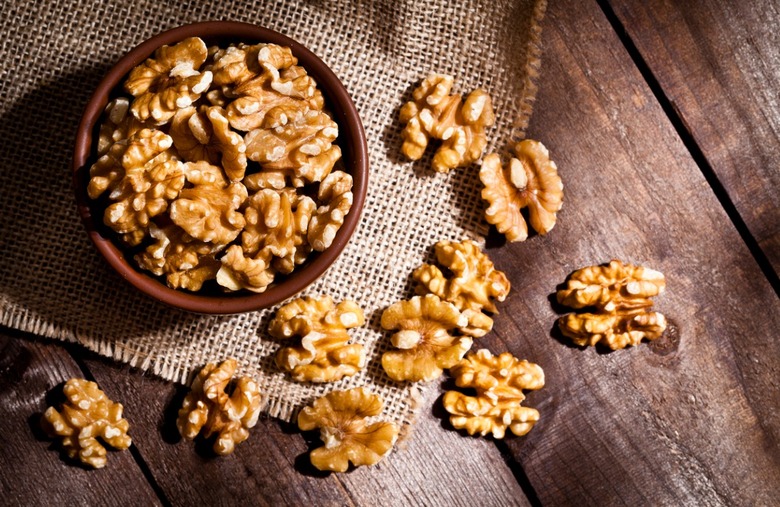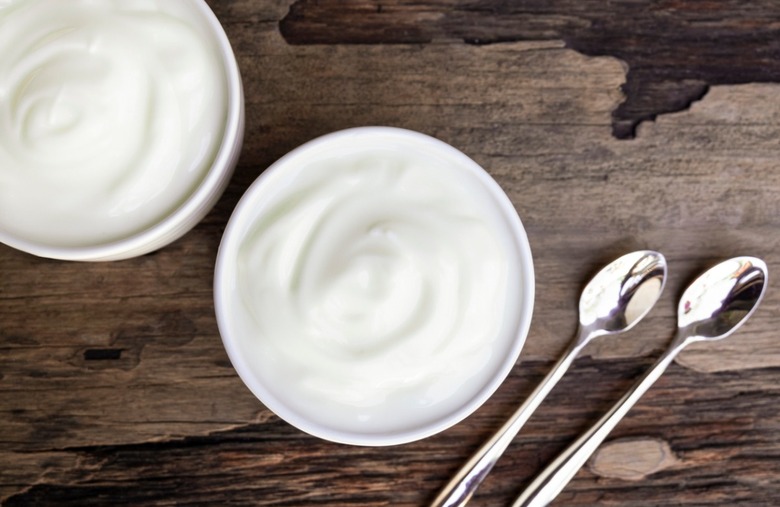Heart Healthy Foods To Add To Your Diet
When it comes to showing your heart some serious love, there are a few things you can do. Managing stress and getting enough sleep are massively important, but so is eating well, according to Julia Zumpano, a registered dietician in preventive cardiology and rehabilitation at the Cleveland Clinic.
"Managing your diet can help reduce cholesterol, reduce blood pressure, reduce weight, weight circumference, triglycerides; all of those things are influenced by the way that you eat," Zumpano said. "And all of those are risk factors for developing heart disease." Incorporating more of these foods into your diet can help you do those things, and you'll be giving your heart a helping hand.
Almonds
Native to the Mediterranean, almonds have been around since 3000 B.C. Technically a fruit, they can help reduce heart disease by lowering cholesterol and promoting anti-inflammation. Great as a stand-alone snack, almonds are also delicious in salads, trail mix and as almond butter.
Apples
There's logic behind the old saying about apples keeping the doctor away. A good source of fiber (and a fan favorite in recipes), apples are rich in vitamin C, which can help keep capillaries and other blood vessels healthy, along with aiding in the absorption of iron and lowering blood cholesterol levels. Confused by all the different varieties? This handy guide to apple types can help.
Asparagus
The perfect summery side dish with any meal, research indicates that along with many other vegetables, asparagus shows potential in not only treating cardiovascular diseases, but also in helping prevent them by promoting anti-inflammation, regulating blood pressure and blood glucose.
Avocado
You might already know that avocado is a fruit, unlike some other exotic fruits you've probably never heard of. Filled with good fats and fiber, avocados are high in potassium, which can help control blood pressure by reducing the effects of sodium. Delicious on toast, in omelets and on salads, avocados also help diners feel full longer.
Bananas
The banana is as good as it gets in terms of grab-and-go foods. Easy to pack in a lunch or snack on any time of day, bananas have virtually no fat, cholesterol or sodium. A good source of vitamins C and B6, the flavorful fruit is also loaded with potassium, which helps regulate blood pressure and fluid balance, both of which are important to heart health.
Beets
Known for their vibrant color and sweetness (although not as sweet as something from these amazing dessert shops), beets can elevate any salad. They also contain betaine, a nutrient that can lessen toxic levels of homocysteine, an amino acid that contributes to the development of heart and vascular disease.
Bell peppers
Grown in an array of vibrant colors, the bell pepper is a popular ingredient and surprisingly easy to cut when you use this simple hack. It's also full of antioxidants, which have been shown to help prevent the development of cardiovascular diseases, as well as cancer, diabetes and Alzheimer's.
Black beans
The American Heart Association recommends eating a variety of beans as part of a heart-healthy diet. Considering they are great in soups, chili, pasta dishes and everyday meals, incorporating them is easy. High in protein and a good way to add more fiber to your diet, black beans are low in saturated fat and are a serious power food. Even better, as part of a healthy lifestyle, they can also help improve blood cholesterol, a leading cause of heart disease.
Blackberries
Unappreciated compared to some of its more popular siblings, the blackberry is among the berries highest in antioxidants and fiber, an unsung hero of the bunch. Rich with nutrients that can help lower blood pressure, blackberries can also help reduce the risk of heart attack and promote good cholesterol.
Blueberries
A perennial favorite in smoothies, oatmeal and healthy desserts, the blueberry is chock full of antioxidants, which studies show can help lower blood pressure and make blood vessels more elastic. The impact might be even greater for women. According to one Harvard School of Public Health study, women who ate blueberries or strawberries three times a week were 34% less likely to have suffered a heart attack than those who ate less.
Bok choy
Derived from the Chinese term for "soup spoon," bok choy is a cruciferous vegetable and can be eaten either raw or cooked. The leafy plant is a great addition to any stir fry, Asian soup or Japanese delicacy like sushi. Low in calories and carbohydrates, bok choy has a variety of nutritional benefits including reducing inflammation and helping lower the risk of cancer.
Broccoli
Full of protein, broccoli is a good source of vitamin C, which research suggests can help prevent cardiovascular disease and reduce blood pressure.
Brussels sprouts
Commonly referred to as "mini cabbages" due to their flavor and compact appearance, Brussels sprouts are named after the Belgium city where they were first cultivated in the 16th century. Though they often top the list of most disliked vegetables, cooked correctly, they are simply delicious. Brussels are also packed with nutritients such as vitamins C and K as well as folate, which is needed for the production of red blood cells.
Cauliflower
Eating whole foods is one of the best things you can do for your heart, according to cardiologists. And those whole foods definitely include caulflower. Loaded with vitamin C and folate, cauliflower has been called "a nutrition superstar" by the Mayo Clinic. It's gluten, cholesterol and fat free. Cauliflower also contains sulforaphane, an antioxidant that protects against cardiovascular disease.
Cayenne pepper
Adding a little spice to your life might benefit your heart, and there are more ways to do it than just with the world's hottest hot sauces. The burning sensation that accompanies cayenne comes from capsaicin — an extract found in chili peppers. People who eat them have been shown to have lower levels of "bad" cholesterol and a lower incidence of deaths from heart disease. Capsaicin has also been shown to be helpful in treating pain from injuries and arthritis.
Cherries
There's something about eating cherries that reminds us of all the delicious things we eat during the summer. Delightful and sweet, especially when they are in season, they're a source of polyphenols and vitamin C, which both have antioxidant and anti-inflammatory properties. Eating cherries has been shown to help decrease oxidative stress, which is linked to certain cardiovascular diseases.
Chickpeas
Roasted in the oven, tossed on a salad or whipped up into an amazing hummus, the chickpea is Mediterranean-diet friendly and has been shown to have a positive impact on cardiac markers. High in protein, folate, fiber and iron, chickpeas may help prevent the development of heart disease and diabetes.
Chia Seeds
Whether cooked or sprinkled raw on cereal or yogurt, these nutty little seeds pack a nutritional punch. A good source of omega-3 fatty acids, fiber, antioxidants, iron and calcium, chia seeds are linked to positive heart health and are a favorite for keto dieters. Go easy when first introducing them into your diet — high in fiber, they can expand once consumed and cause an upset stomach.
Dark chocolate
Some studies suggest that dark chocolate is high in flavonoids, which have been found to have antioxidant and anti-inflammatory benefits. While the jury is still out on whether or not eating dark chocolate actually lowers the risk of coronary heart disease, it may help reduce blood pressure and improve blood flow to the brain and heart when eaten in moderation. As if people needed more reasons to eat chocolate every day.
Cinnamon
A superstar among spices, cinnamon needs no introduction. It's what makes things like cinnamon buns and some of our favorite pumpkin spice products taste so good. Even better, cinnamon has been shown to be helpful in lowering blood sugar levels in people with Type 2 diabetes and can also be beneficial in reducing high cholesterol and triglycerides.
Coffee
Your morning java habit might provide more than just an energy boost. Among the many things you may not know about coffee, according to a study published in the U.S. National Library of Medicine, coffee (both decaf and regular) has been associated with a lower risk of mortality, including deaths attributed to heart disease. It's also been linked to a reduced risk of Type 2 diabetes and Parkinson's disease. So you can feel OK about a visit to one of the best coffee shops in America.
Collard Greens
Your mom always told you to eat your vegetables, especially the green ones, and she was on to something. Packing a nutritional punch, collard greens are filled with vitamins C and E, along with potassium and calcium. Just make sure that like any other produce, you give them an extra rinse before using. For collard greens cooked to perfection, order them at one of the best soul food restaurants in America.
Edamame
A great snack to incorporate into your post-workout routine, edamame is a young soybean and can be found both fresh and frozen at the grocery store. Cholesterol free and low in saturated fat, edamame contains omega-3 fats, which are linked to a lower risk of cardiovascular disease, and polyunsaturated fats, which can help lower cholesterol.
Eggs
Full of protein and vitamins, eggs have undergone their fair share of scrutiny through the years. After criticism around being high in cholesterol, thinking has changed. A recent study of more than 500,000 Chinese adults showed that eating up to one egg a day was associated with a lower risk of cardiovascular disease. Before you cook them up for breakfast, just make sure you know the secrets to making the perfect scrambled eggs.
Eggplant
Most people recognize eggplant by its bright, purple appearance and automatically think of eating it in some version of grandma's parmigiana. When it's not buried in sauce and cheese at one of the best Italian restaurants in America, eggplant is highly nutritious. Rich in magnesium and other vitamins, eggplant also has potassium, which helps build muscle and is good for your heart.
Extra virgin olive oil
Consumption of extra virgin olive oil has been shown to be beneficial in reducing oxidative stress, chronic inflammation and immune system diseases including cancer and cardiovascular disease, along with lowering the risk of stroke. Because it's cold-pressed within 24 hours of harvesting the olives, extra virgin olive oil retains more antioxidants than regular olive oil. Be careful of how you cook with it, however. You may be using it all wrong in your dishes.
Flaxseed
Ground flaxseed is highly nutritious. The tiny seed contains fiber, omega-3 fatty acids, proteins, minerals and other beneficial nutrients. What it lacks in size, flaxseed makes up for in health benefits including potentially lowering blood cholesterol, helping to promote good heart health. Flaxseed can be added to smoothies and yogurt, as well as these popular breakfast cereals.
Garlic
A favorite addition to most foods, garlic makes everything from pasta to frozen pizza taste good. A member of the onion family, garlic has been used throughout history for its medicinal and culinary benefits. Garlic's health benefits are many (even if it does wreak havoc on your breath), and include boosting immunity, having a positive impact on your blood pressure and potentially helping prevent Alzheimer's. Use these easy ways to add more garlic to your diet.
Grapes
Grapes are the perfect companion to cheeses from around the world and are pretty much nature's wonder fruit. Grapes are rich in resveratrol, which, according to a study by The International Journal of Molecular Sciences, can help promote heart-related benefits including reducing hypertension and lowering blood sugar in patients with diabetes.
Green tea
In addition to being on the list of foods that neurologists recommend for brain health, some short-term studies suggest drinking green tea may improve how well your blood vessels respond to stress, which can have serious side effects on our bodies. Another study shows that people who regularly drink green tea might be less likely to have a stroke or heart attack, although it's unclear whether other lifestyle factors play a part.
Hazelnuts
The American Heart Association recommends eating about four servings of unsalted nuts a week. There are a lot of surprising reasons to eat more fat and hazelnuts are a great way to get it. They also contain protein, omega-3 fatty acids, fiber, vitamin E, and L-arginine — a substance that can help improve artery walls, making them less prone to blood clots.
Herring
While many people take daily fish oil supplements, it's not a bad idea to go directly to the source when incorporating more omega-3 fatty acids into your diet. The American Heart Association recommends getting at least two servings of fish a week and herring has more omega-3 fatty acids than tuna or salmon.
Kale
A leafy green vegetable with tons of nutrients, kale is full of vitamins A and C, potassium, calcium and fiber, making it a contender for the best superfood ever. A member of the Brassicaceae family (alongside cabbage, arugula and Brussels sprouts), it's easily incorporated into many different recipes including these amazing kale smoothies you actually want to drink.
Kidney beans
Included in plenty of baked bean recipes, the kidney bean is a protein-rich legume named for its resemblance to the kidney. High in minerals and fiber, kidney beans can help improve blood cholesterol, a major contributor to heart disease. They're also delicious in many regional chili dishes.
Lentils
Part of the legume family, lentils come in several varieties including brown, green and red. High in fiber and protein and low in fat, lentils can help improve blood cholesterol, a leading contributor to heart disease. Great as a stand-alone side dish, they're also good added to soups like this slow-cooker lentil soup.
Oats
Oatmeal for breakfast is one of the best ways to start your day. Loaded with fiber, zinc, magnesium and phosphorus, oats are associated with a reduced risk of coronary disease and can also help with the effects of inflammation related to various diseases, including diabetes. If you don't have time to make oatmeal from scratch, consider one of the best instant oatmeals instead.
Papaya
Native to Central and South America, the papaya's sweet fruit contains potassium, magnesium, fiber and beta-carotene. Along with being a great meat tenderizer, it's also recommended by the American Heart Association as one of the "colorful" fruits and veggies to incorporate into a healthy diet.
Peanut butter
Peanut butter is a massively popular spread and in moderation, it can be good for you. High in protein and nutrients, peanut consumption is associated with a reduced risk of mortality and death due to cardiovascular disease, according to a study published by JAMA Internal Medicine. Keep in mind that the peanut butter should be all-natural, with no added sugar or oils. Try one of these healthy brands.
Pecans
Another member of the nut family, pecans have their own distinct appeal and are oh-so-good in salads you can eat year-round or, on special occasions, the iconic pie. They also may promote heart health by lowering "bad" cholesterol and triglyceride levels, which can contribute to the buildup of plaque in your arteries.
Pinto beans
The most widely produced bean in the U.S., the pinto is also one of the most popular. Translated from the Spanish word for "painted," it's most commonly used in refried beans, rice dishes and in some of the best burritos in America. Like many other beans, pintos are high in fiber and minerals, and according to the American Heart Association, eating beans as part of a healthy diet can help improve blood cholesterol.
Pistachios
Even though they take work to get open, pistachios are worth the effort. Easy to take on the go, they're nutrient-dense and full of fiber and unsaturated fatty acids. A study published in the U.S. National Library of Medicine indicates that eating pistachios has been shown to have a beneficial effect on blood pressure, helping to improve cardiovascular risk. In moderation, they are a great snack food that won't sabotage your workout.
Pomegranate seeds
Let's face it, everyone craves a sugary treat now and then, and pomegranate seeds are a healthy way to satisfy a sweet tooth. They might be tiny, but they pack a powerful punch. The antioxidant compounds found in pomegranate seeds have been linked to lower blood pressure and cholesterol levels, along with helping decrease inflammation and oxidative stress.
Pumpkin seeds
Obsessed with all things fall? You're in luck because pumpkin seeds can be enjoyed all year round. Pumpkin seeds, also known as pepitas, are highly nutritional and can add fabulous flavor to salads or are a tasty snack on their own. High in magnesium, pumpkin seeds can not only help prevent migraines, but they can aid in lowering blood pressure. Make sure, however, to buy unsalted ones.
Raspberries
Unlike all of those foods and drinks that put your blood pressure through the roof, raspberries are relatively low in sugar and are a good source of fiber, vitamin C and beta carotene. These sweet berries also contain anthocyanins, which can help reduce inflammation that leads to cardiovascular disease.
Red wine
Drinking red wine is actually one of those so-called bad habits that are actually good for you. While the debate continues over possible benefits (or risks) of drinking an occasional glass of red wine, it's been shown to contain resveratrol, an antioxidant that some studies have linked to a lower risk of inflammation and blood clotting, as well as helping prevent artery damage caused by "bad" cholesterol.
Salmon
The American Heart Association recommends eating two servings of fish a week. Salmon is among the most popular fish choices, especially when you know how to grill salmon to perfection. A fatty fish, salmon contains a high amount of omega-3, which can help reduce blood clotting and blood pressure and decrease the risk of heart failure.
Sardines
This oily fish isn't everyone's favorite, but they are popular in many cultures, including in Portugal where they celebrate them in one of the biggest festivals of the year. Like many of the other heart-healthy fish, sardines are rich in omega-3 fatty acids, which have been shown to reduce inflammation associated with stroke and heart disease.
Sesame oil
Considered one of the best foods for healthy, glowing skin, sesame oil has also been shown to potentially improve lipid profiles. Made from the sesame seed, sesame oil can help lower cholesterol and blood pressure along with having anti-cancer effects, according to a study by the International Journal of Preventive Medicine.
Spinach
Though spinach has been around for hundreds, if not thousands, of years, it gained serious traction as a superfood in the 1920s. One of the unexpected ingredients that go great with eggs, spinach is high in iron and vitamins A and C. Packing a nutritional punch, it also contains omega-3 fatty acids, which can help fight inflammation and other chronic diseases.
Squash
A favorite to grow in the garden even if you're a beginner, squash can be used in everything from soup to spaghetti. With an array of varieties including winter, summer, acorn, butternut, yellow and zucchini, it's easy to add squash to your diet. Though different varieties offer different health benefits, most, if not all, are highly nutritious and are full of fiber, which can help lower cholesterol as part of a healthy diet.
Sweet potato
Sure, sweet potatoes don't get as much attention as standard potatoes that have so many ways to cook them perfectly, but they should. Low in calories, sweet potatoes can be used to make a healthier version of french fries. A favorite among Thanksgiving side dishes, they're a good source of beta carotene, potassium and other vitamins and minerals. They can also help boost the immune system, promote healthy bones and have a positive impact on blood pressure.
Swiss chard
A member of the beet family, Swiss chard has bright red stalks and vibrant green leaves. Not as common as kale or spinach, it rivals both in terms of its nutritional benefits. According to an article by the Inova Heart and Vascular Institute, eating dark-green, leafy vegetables like Swiss chard can help the body break down homocysteine, an amino acid associated with a higher risk of heart disease. Great simply sauteed with garlic, Swiss chard is easily right up there with the 50 best foods for weight loss.
Tofu
Though there's some debate over tofu and its health benefits, for vegetarians and anyone else looking to supplement animal foods, it's a great source of protein despite the high levels of saturated fat and cholesterol. According to the Cleveland Clinic, eating a plant-based vegetarian or vegan diet can be a healthy alternative to eating meat, offering potential health benefits like lowering the risk of heart disease, hypertension, diabetes and cholesterol. Made from soybeans, tofu is easily prepared and can be mixed with just about anything, and can be found on the menus of these vegan-friendly restaurants in every state.
Tomatoes
Fresh from the garden and one of the best plants for rookies to grow, tomatoes are great just sliced up and eaten as is. Loaded with nutrients like folate and potassium, tomatoes also contain lycopene, which is what gives them their redness and can help keep cells from becoming damaged.
Tuna
You can reap some serious heart-healthy benefits from tuna. A member of the mackerel family, this saltwater fish is yet another great option for getting the American Heart Association's recommended omega-3 serving each week. On the menu as a tartare at the most expensive restaurant in the world, tuna is also good in a sandwich or served on a plate of greens.
Turmeric
Used medicinally in India for centuries, along with starring in many of the dishes served up at American's best Indian restaurants, turmeric is the spice equivalent of a warm hug. One of the core components of curry, it's believed to boast numerous benefits including decreasing the risk of cardiovascular mortality. A study published in the U.S. National Library of Medicine suggests that it also can reduce inflammation and help with certain diseases including pancreatitis and arthritis.
Walnuts
Like pecans and almonds, walnuts contain unsaturated fatty acids and are high in fiber and omega-3 acids. Used in traditional Chinese medicine, walnuts are among the foods that can help fight memory loss along with acting as a potent pain reliever. As part of a healthy diet, they can also help lower "bad" cholesterol and triglyceride levels.
Yogurt
Loaded with calcium and vitamin D, yogurt is not only found in many marvelous Mediterranean dishes, it's also beneficial in building muscle and strengthening bones. In a study published on the National Institutes of Health website, eating yogurt is associated with healthy blood pressure. When eating yogurt, it's important to choose one that has little to no sugar, as maintaining a diet that's high in sugar is one of the worst things you can do for your heart.
More from The Daily Meal:
What Your Heart Rate Can Tell You About Your Health
Unexpected Signs of an Unhealthy Heart
Cardiologists Share the Worst Things You Can Do for Your Heart
